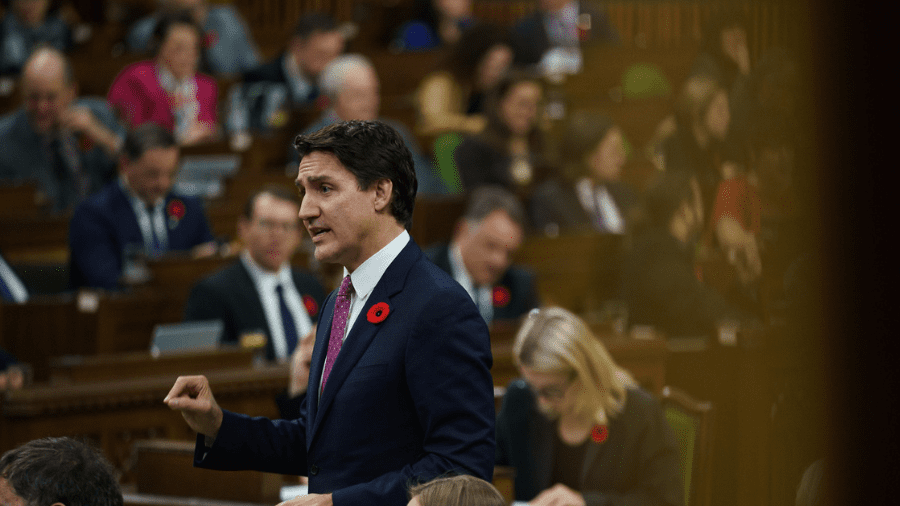This article originally appeared in the Globe and Mail.
By Heather Exner-Pirot, December 21, 2023
To meet Canada’s commitment to its Paris Agreement climate goals, the federal government has announced increasingly heavy-handed emissions reduction policies this year. It culminated Monday in the publication of regulated targets for electric-vehicle sales: an EV mandate.
History has shown us time and again that government quotas are no match for the market. The Liberals want to show us one more time why this is the case.
There is absolutely nothing wrong with EVs. Those who own them tend to love them. The car manufacturing industry is all-in on EVs, and globally has committed US$1.2-trillion toward electrification.
The problem is in the attempt to dictate, by government fiat, what consumers can or cannot buy. In the case of the EV mandate, the federal government is using dealers to enforce their strategy. One hundred per cent of light duty vehicles sold in Canada by 2035 must be EVs, with mandatory sales targets starting at 20 per cent in 2026.
If a dealer falls under the prescribed target for a particular year, they are required to buy expensive credits or pay for public charging stations to atone for their sin. The most likely response will be to sell fewer gas-fuelled vehicles than demand would indicate in order to meet the required ratios and avoid the penalties.
You don’t have to be an economist to predict the outcome: waiting lists, shortages and a black market for internal combustion engines. But it’s worth being specific about why a federal EV mandate can’t overcome the laws of supply and demand.
The first is the cost of EVs: They are more expensive than internal combustions engines. EV adoption is overwhelmingly led by urban, high-income consumers who can charge at home. Aside from nudging auto manufacturers to build charging stations, whose uptake is questionable, the mandate addresses none of the logistical and financial constraints that apartment dwellers, renters and low-income car owners face in owning an EV.
The federal government has pointed to Norway, where almost 90 per cent of new car sales are EVs, as an example of how these challenges can be overcome. But that country’s EV uptake is driven by a hefty subsidy, more than triple the Canadian amount, at about $16,000 a vehicle (and made possible by the revenues from their oil and gas exports). That’s the equivalent of a $700 a tonne carbon tax, and last year it represented 2 per cent of their national budget. I can think of no more expensive way to reduce emissions.
The second problem with the EV mandate is that the dealers don’t control the electricity grid. In parallel with the mandate, the federal government is also pushing Clean Electricity Regulations, which will severely strain utilities’ ability to meet additional demand. And it’s not just capacity that matters – it’s the ability to distribute additional power into millions of homes. In many neighbourhoods and small towns, that distribution capacity does not exist, and it will be very expensive to add.
The third is range in rural and remote areas. The federal government acknowledges that lack of charging infrastructure and battery performance in cold weather is an issue. But they just assume that it will be worked out over time – no need to worry about it now.
Fourth is the ability of manufacturers to ramp up their production to meet EV mandates and incentives across the Western world. This will depend on a supply chain that does not yet exist, from critical minerals, to mechanics, to electricians. And it will depend on greater profitability in the sector, which, outside of China, is mostly selling EVs at a loss.
No amount of regulation from Ottawa can solve all of these problems. There are some that see the EV mandate as a Hail Mary from a government that is unlikely to win re-election. The mandate, therefore, is a foolish but benign distraction.
But for refiners, whose profitability depends on some level of gasoline demand, it causes tremendous uncertainty. As long as the EV mandate hangs over their heads, they will be unlikely to invest in upgrading their existing assets, even to produce clean fuels (as mandated this year under the Clean Fuel Regulations, but which EVs would not use), and they will be very reluctant to invest in new refineries.
With our fast growing population, this will inevitably squeeze the availability of the many refined products and distillates the Canadian economy still needs. There is a cost to these policies, even when unimplemented.
The series of climate policies the Liberals have imposed since Steven Guilbeault was appointed Minister of Environment have mostly applied to industry. But the EV mandate targets consumers, limiting what they can and cannot buy when it comes to their vehicle.
Alas, consumers are voters. And command economies don’t work well in democracies.
Heather Exner-Pirot is director of energy, natural resources and environment at the Macdonald-Laurier Institute.






